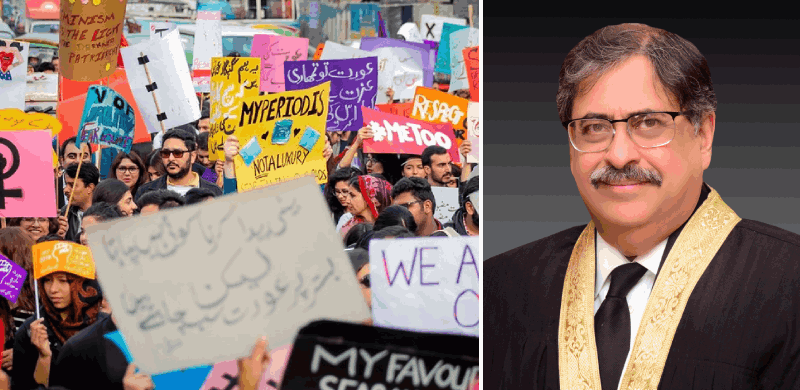
The Islamabad High Court (IHC) on Thursday rejected the petition filed against the Aurat March and slammed the petitioner for doing ‘propaganda’.
The petition was filed by PJEON (Organisation for Peace, Justice and Education) chairman, who claimed that some of the placards during the Aurat March were contrary to the teachings of Islam.
Among the slogans mentioned in the petition were ‘Mera Jisam, Meri Marzi (My Body, My Choice)’ and ‘Meri Shaadi Nahi, Meri Azadi ki Fiqar Karein (Worry About My Freedom, Not My Wedding)’.
The petitioner also claimed that the Aurat March had campaigned against Nikkah, which was against the teachings of Islam.
Justice Athar Minallah dismissed the petition saying that it was not fit for hearing. He said that the anti-Nikkah slogans would have been someone’s individual opinion and cannot be attributed to the Aurat March’s agenda.
“Instead of doing this propaganda, contact the relevant forum,” Justice Minallah directed the petitioner, who responded that he was not doing ‘propaganda’ and that he had approached relevant forums but to no avail.
On International Women’s Day, Pakistani women challenged the patriarchy by taking to the streets in great numbers.
Aurat Marches were held in various cities of the country. Participants included women students, human rights activists, members of the marginalized groups and male allies of the feminist movement.
In Lahore, the march was attended by prominent human rights activists, including Hina Jilani and Nighat Dad.
The March due criticism from various quarters. For example, religious scholar Jawad Naqvi termed Aurat March participants the 'most evil' of all women. He was slammed on social media for his derogatory and inappropriate words.
The petition was filed by PJEON (Organisation for Peace, Justice and Education) chairman, who claimed that some of the placards during the Aurat March were contrary to the teachings of Islam.
Among the slogans mentioned in the petition were ‘Mera Jisam, Meri Marzi (My Body, My Choice)’ and ‘Meri Shaadi Nahi, Meri Azadi ki Fiqar Karein (Worry About My Freedom, Not My Wedding)’.
The petitioner also claimed that the Aurat March had campaigned against Nikkah, which was against the teachings of Islam.
Justice Athar Minallah dismissed the petition saying that it was not fit for hearing. He said that the anti-Nikkah slogans would have been someone’s individual opinion and cannot be attributed to the Aurat March’s agenda.
“Instead of doing this propaganda, contact the relevant forum,” Justice Minallah directed the petitioner, who responded that he was not doing ‘propaganda’ and that he had approached relevant forums but to no avail.
On International Women’s Day, Pakistani women challenged the patriarchy by taking to the streets in great numbers.
Aurat Marches were held in various cities of the country. Participants included women students, human rights activists, members of the marginalized groups and male allies of the feminist movement.
In Lahore, the march was attended by prominent human rights activists, including Hina Jilani and Nighat Dad.
The March due criticism from various quarters. For example, religious scholar Jawad Naqvi termed Aurat March participants the 'most evil' of all women. He was slammed on social media for his derogatory and inappropriate words.
